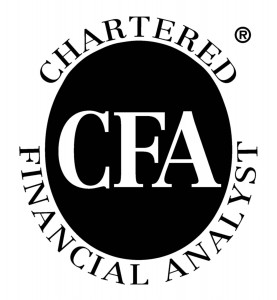 A chartered financial analyst (CFA) is a professional accreditation that demonstrates that integrity, knowledge and competency of financial analysts. The CFA accreditation is offered through the CFA Institute.
A chartered financial analyst (CFA) is a professional accreditation that demonstrates that integrity, knowledge and competency of financial analysts. The CFA accreditation is offered through the CFA Institute.
Position Overview
Chartered financial analysts work for banks, finance, insurance and investment firms. Regardless of the industry, they will perform similar tasks. Chartered financial analysts usually source prospective clients, analyze incoming referrals and assess client needs. They collaborate with different financial professionals to deliver customized services and solutions to clients. They recommend suitable products and services for clients based on their goals, preferences and risk profiles. Chartered financial analysts have sales, compliance, administrative, customer service and new client development duties. They seek the expertise of financial specialists to identify and acquire individual solutions for clients. Lastly, they maintain professional relationships with clients, team members and management.
Industry Profile
Chartered financial analysts who work in the investment industry deal with equities, mutual funds and alternative investments. They maintain current portfolios and research potential investment ideas and opportunities. They work with interdisciplinary teams to evaluate potential investment ideas by using a variety of sources, such as SEC filings, analyst reports, investment periodicals and annual company reports. These chartered financial analysts research specific firms and industries in order to recommend sales and purchases to portfolio managers. They participate in the formulation and development of internal policies and strategies. Chartered financial analysts initiates and maintain contact with investment firms, banks and clients to insure a continuous flow of appropriate information sharing and investment opportunities.
CFA Certification
There are three basic requirements to become a CFA charter holder through the CFA Institute. First, candidates must successfully pass all three CFA exam levels. Second, they must have at least 48 months of applicable professional work experience. Third, candidates must officially join the CFA Institute, affiliate with a local chapter and submit a professional conduct statement. Most potential CFAs struggle with meeting the knowledge requirements because the three exams encompass a comprehensive body of knowledge that the CFA Institute mandates that investment professionals must know. The level one exam contains questions focused on investment tools and ethical and professional standards. The level two exam requires complex analysis regarding asset valuations and ethical situations. The level three exam requires candidates to synthesis all the theories and analytical tools together to effectively manage portfolios.
The Benefits
There are proven benefits to becoming a chartered financial analyst, according to Forbes. Candidates benefit from having an expanded education. The CFA Institute credential is a great addition on resumes. CFA holders enjoy an enhanced reputation benefit because firms and clients recognize that it takes time, dedication and hard work to earn the charter. Thus, the CFA credential establishes competency, ethical grounding and the powerful analytical skills. CFA holders will enjoy financial benefits through promotions, salary increases and major career opportunities. Finally, professionals in certain financial fields are expected to earn the charter. This includes investment bankers and managers as well as traders, analysts and financial planners.
Related Resource: Become an Investment Manager
The CFA credential is an industry standard accreditation for investment professionals that establishes expertise and credibility.
 Follow
Follow